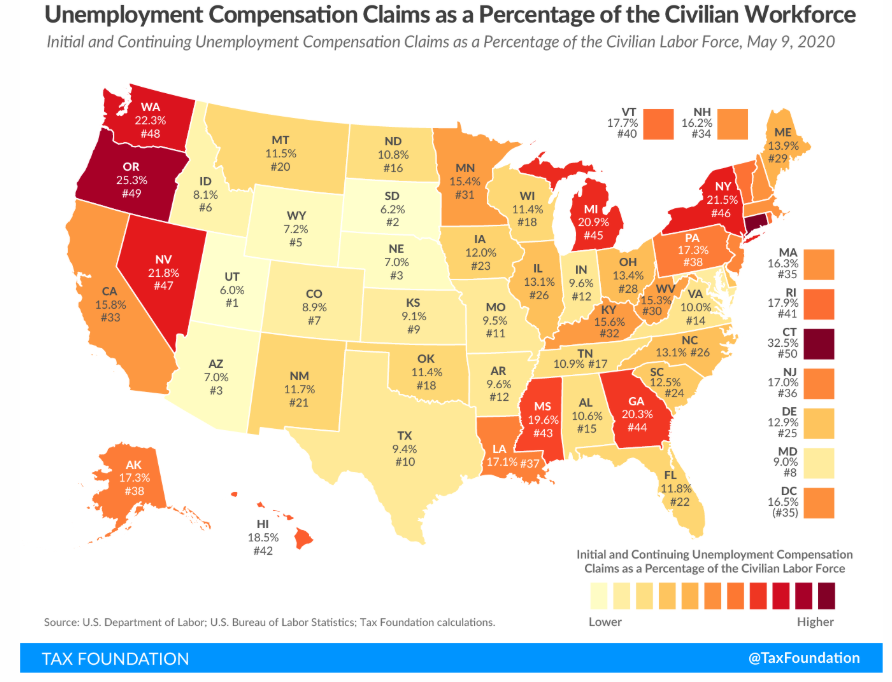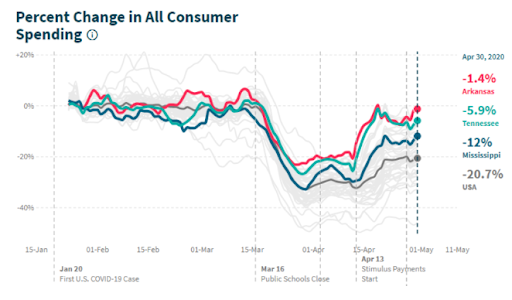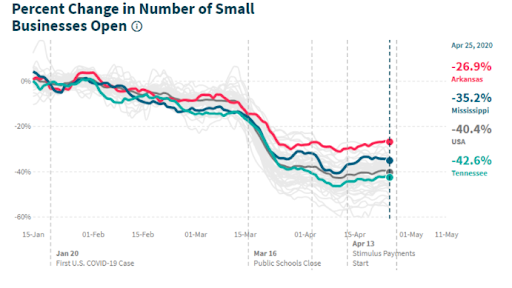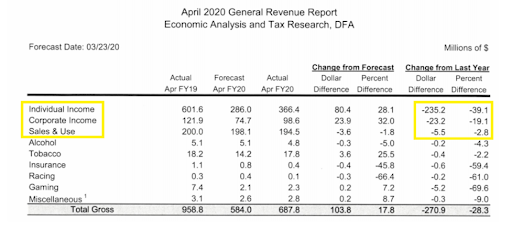By Caleb Taylor
Arkansas is doing relatively well so far compared to the rest of the nation in weathering the economic shocks from COVID-19 since March, according to UCA Assistant Professor of Economics Jeremy Horpedahl.
Horpedahl, an ACRE Scholar, spoke to attendees of a webinar hosted by Americans for Prosperity-Arkansas on May 11 about economic data that could help them better understand COVID-19’s impact on the Arkansas economy.
Arkansas’s Unemployment Claims as Percentage of Labor Force
Unemployment claims in Arkansas as a percentage of the labor force had increased almost ten times since February, from 1 percent to 9.6. percent. By comparison, the unemployment rate in Arkansas is up from 3.5. percent in February to 4.8 percent in March. Horpedahl called the unemployment rate an inferior measure because it’s not as up to date and doesn’t track workers who’ve dropped out of the labor force.
Horpedahl said:
It looks like we are weathering this much better than some states that are taking this really hard. Compared to our neighboring states, we do have the lowest or close to the lowest percentage of people who have filed for unemployment insurance. Almost ten times as many people are filing for unemployment insurance as compared to before the crisis in February.”
Arkansas’s Consumer Spending Remains Stable
One place where Arkansas’s economy still remains relatively unscathed is consumer spending. After taking a big dip in late March through the mid-April, consumer spending at the end of April had only declined about 1.4 percent compared to mid-March.
Horpedahl said:
Arkansas has had a very small decline compared to most other states. We are almost back to the level of consumer spending we had in January or even very comparable to what we had before everything started happening in the middle of March. Whereas the United States as a whole is down 20 percent. Some states are down 35 to 40 percent. Arkansas is looking pretty good related to that.”
Arkansas’s Small Business Closures
Approximately 27 percent of Arkansas’s small businesses had been closed as of late April. While that would be a staggering figure in any normal time, it’s actually close to the lowest percentage change in the nation this year.
Horpedahl noted late April was before Gov. Asa Hutchinson began lifting some specific restrictions on businesses in Arkansas.
Horpedahl said:
Of course, we’ve had a decline. Twenty-seven percent of small businesses were closed around May 1. That’s the best in the nation. Utah might be slightly better. We never had a general shutdown order, but we’ve done even better than other states that haven’t done that. It’s still a lot and doesn’t mean there’s nothing to worry about.”
Arkansas General Revenue Experiences Short-Term Declines
While discussing state government revenue losses from COVID-19, Horpedahl focused on individual income taxes, corporate income taxes and sales & use taxes, since revenues from these taxes account for around 95 percent of state general revenue.
In the month of April, sales tax revenue declined slightly by 2.8 percent compared to last April, while individual and corporate income taxes declined 39.1 and 19.1 percent respectively.
Some of the income tax decline is attributable to the delay in the income tax filing deadline from April 15 to July 15 in Arkansas to correspond with the income tax filing deadline delay at the federal level. How much of the decline is responsible for this revenue decline will be known later on in the summer.
Horpedahl said:
Income tax revenue is way down. Part of that is that they’ve pushed back the income tax filing date. The long term impact on the state budget is pretty minimal, but the short term impact is huge. A big part of that is we have a delayed income tax filing as every other state did to correspond with the IRS. I think that’s a good thing to do, because people can’t pay (their taxes) if they’re out of work. That means we just need to weather a few months of this and in July people need to pay their income taxes and we’ll see what the economy looks like in July. Arkansas to me overall looks pretty well-positioned. Anything can happen, but all the data I’ve shown you makes me feel pretty optimistic about Arkansas compared to other states.”
You can watch the entirety of Horpedahl’s talk here. For more, check out Horpedahl’s op-ed on the UCA College of Business blog entitled “Understanding Economic Data in the COVID-19 Crisis.”




